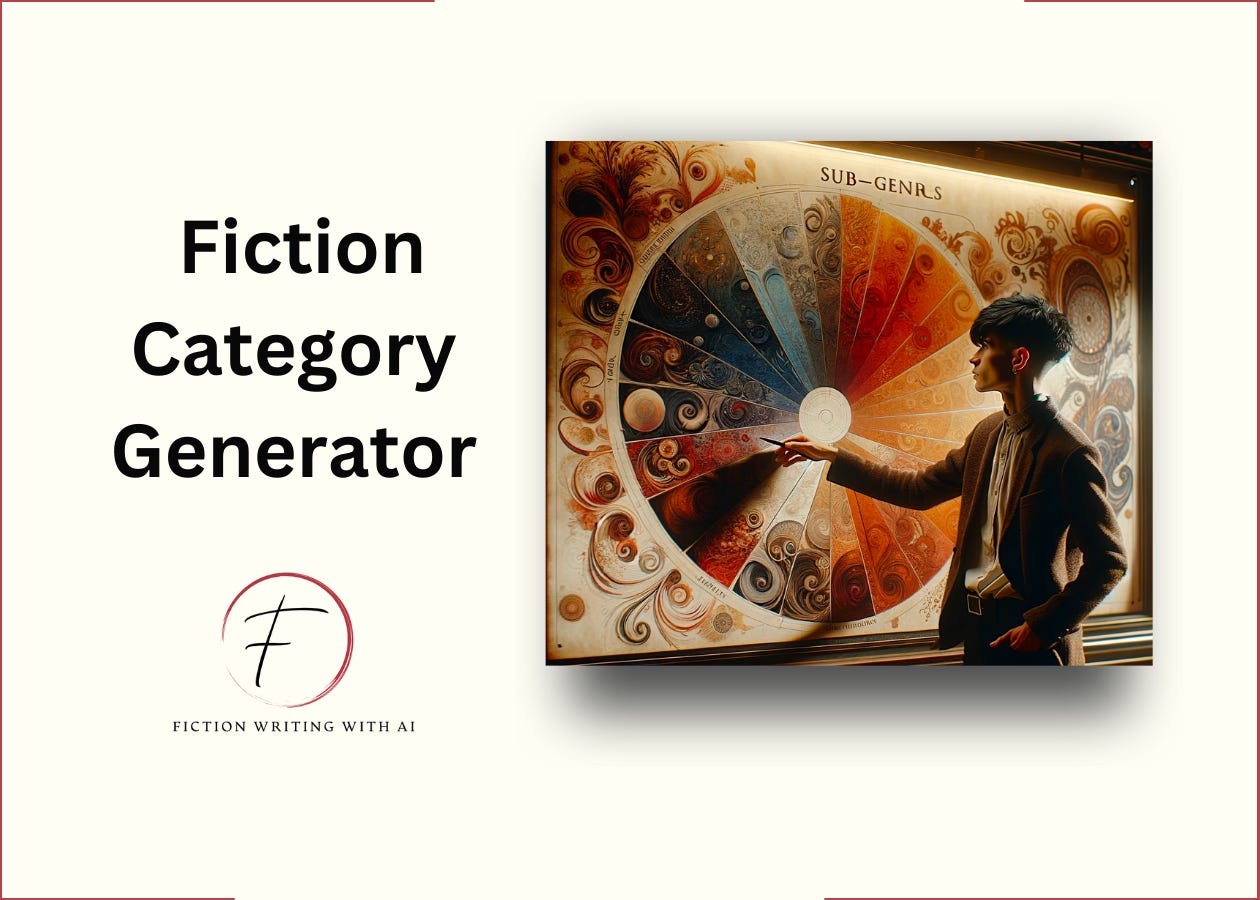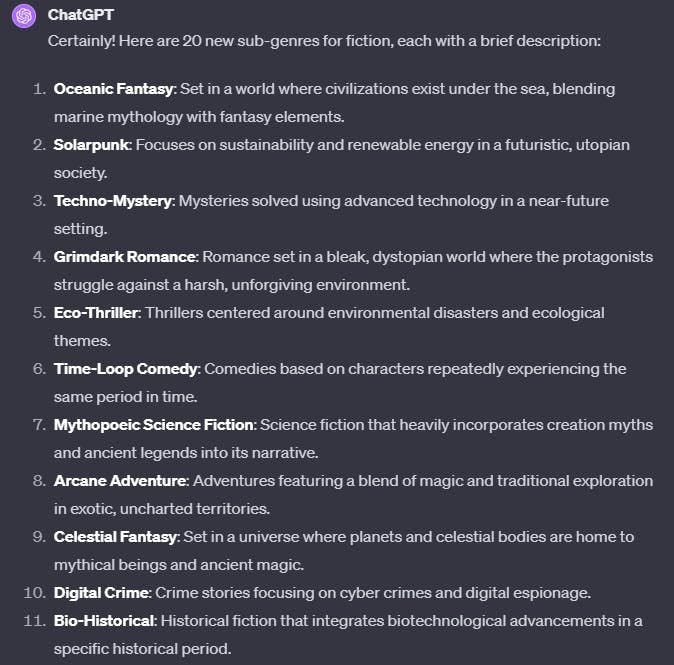Looking to start writing online in 2024?
The next Ship 30 for 30 cohort set sail on January 1st! Kickstart the year by writing & publishing every day for 30 days, build your daily writing habit, and form lifelong friendships along the way. Click here for your special $100 off coupon as a THANK YOU for being a Fiction Writing With AI subscriber!
Hey there!
Today, I am going to teach you how to create a Sub-Genre Niche you can own.
But first you need to know:
When it comes to writing fiction, there are two mistakes most storytellers make (which is keeping them unnoticed and unsuccessful):
The 2 big mistakes fiction writers make
Here they are:
Mistake #1: Competing in an existing sub-genre. Fiction writers tend to work in sub-genres that already exist. For example, if they want to write a fantasy novel, they think they need to write the next Game of Thrones and focus on writing a political fantasy story. So the only way they think they can stand out is by creating a better plot, better characters, and better worlds. This leads us to our next mistake…
Mistake #2: Wasting hours on a story outline which will never work. Once they’ve decided (often subconsciously) to compete in the same category as hundreds of other writers, they spend hours developing story lines to try and “beat” these other works, only to find that these will never work or they just aren’t that excited by them (because they feel like they’ve been “done” before).
Luckily, there is a way to get avoid making these two mistakes.
It’s time to create your own Sub-Genre.
Instead of jumping straight into the writing, laying the ground rules for your story is important.
And the first step in doing this is creating your category of fiction or “Sub-Genre”.
Fiction Category Creation 101
All fiction sits inside “Mega Genres”.
Think of these as sections in your favorite bookshop:
Mystery
Fantasy
Romance
Etc
This is a crucial point because every reader thinks like a bookshop is organized: in categories. Your readers will gravitate to the section which they find the most interesting or appealing. Then they begin looking for sub-genres within that mega-genre.
Sub-Genres are the smaller, more specific terms we use to organize stories within Mega-Genres.
So instead of competing with an existing Sub-Genre (like Game of Thrones and political fantasy), to really stand out you need to name and claim your own Sub-Genre.
In other words, you create your own shelf in the bookstore.
It provides the scaffolding for the rest of your story, driving your creative decisions.
And it’ll massively help when we start to build your story and the world it is set in with AI. A quarter of the work is done by making this one decision. It took me 10 years to learn this, but this valuable lesson has accelerated my entire fiction writing process.
OK, let’s dive into creating your Sub-Genre!
Step 1: Choose Your Sub-Genre
There are two ways to create a new Sub-Genre for yourself—and become known for a fiction niche you own.
Here are some common Mega-Genres:
Crime
Thriller
Action
Fantasy
Mystery
Comedy
Historical
Suspense
Romance
Adventure
Science Fiction
Magical Realism
Here are some Sub-Genres to get your creative juices flowing:
Satire
Mythic
Military
Western
Dystopian
Cyberpunk
Steampunk
Paranormal
Space Opera
Psychological
Alternate History
Post-Apocalyptic
The reason Step 1 is to Choose Your Sub-Genre is because all your Character, Plot, and Setting differentiation is built on this one decision.
Choosing “Medical Military Romance” will give you very different ideas for characters, plot points, and settings than “Medieval Vampire Romance.”
This is why you should make this strategic choice first.
Luckily for us, we can use ChatGPT to help us come up with new and unique Sub-Genres:
Here’s the prompt:
I am going to train you to become a Fiction Sub-Genre Generator.
Here are 12 Mega-Genres in fiction:
1. Mystery
2. Crime
3. Suspense
4. Thriller
5. Comedy
6. Romance
7. Action
8. Adventure
9. Science Fiction
10. Fantasy
11. Historical
12. Magical Realism
And here are 13 sub-genres (as examples) within various Mega-Genres:
1. Space Opera
2. Cyberpunk
3. Dystopian
4. Post-Apocalyptic
5. Alternate History
6. Military
7. Western
8. Steampunk
9. Cyberpunk
10. Paranormal
11. Psychological
12. Satire
13. Mythic
Please generate 20 new sub-genres I could write a fiction story in.
Please name each sub-genre & include a 1-sentence description of what makes the sub-genre different.
When I ran this prompt, here’s what ChatGPT came up with:
Boom!
Now that’s a lot of Sub-Genres.
Feel free to keep asking ChatGPT for suggestions until you find a few that really grab your attention. AI here is just your Digital Fiction Writing assistant so they do the work, and your taste will drive the creative decisions. Choose one to take forward into the next step.
And with this one decision, you’re well on your way to becoming known for a Fiction Niche you own.
That’s a wrap!
Chat soon!
–Nicolas Cole
PS… If you’re enjoying Fiction Writing With AI, will you take 6 seconds and forward this edition to a friend? It goes a long way in helping us grow the newsletter (and bring more and more Fiction Writers into the world).
And if you want to be an even better friend, you can give the gift of Fiction Writing With AI by clicking the button below. Please let us know if you choose this option so we can send over a bonus as a thank you.
And finally, we’d love your input on how we could make Fiction Writing With AI even more useful for you! So please leave a comment with:
Ideas you’d like covered in future editions
Your biggest takeaway from this edition
We read & reply to every single one of them!






Such a fun exercise. Here's one result that I was particularly excited to see and might explore further.
Window Washer's Whodunit: A window washer becomes an amateur sleuth, witnessing crimes from the outside of skyscrapers.